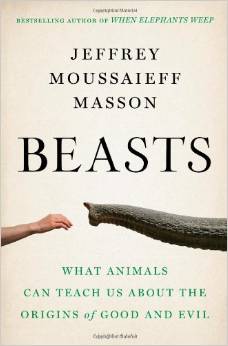What happens when a predator becomes prey?
Today, the animals we have long viewed as predators – lions and tigers, bears and sharks – are in some cases on the verge of extinction. And, thanks to science, we now know that these predators are not nearly so violent or dangerous as we were once told (or continue to tell ourselves).
Nevertheless, we cling to the idea that these “beasts” are lesser creatures, and they suffer for it.
For example, it is estimated that as many as 100 million sharks are killed each year, many as bycatch and many more simply for their fins – to be used in shark fin soup. And grey wolves, as they begin to rebound from near extinction, are finding themselves demonized in states such as Oregon and Idaho.
In Beasts: What Animals Can Teach Us About the Origins of Good and Evil, Jeffrey Moussaieff Masson aims to rid us of outdated or incorrect notions of the apex predators of our planet – those animals that dwell at the top of the food chain. This is a cleverly constructed book because it draws readers in with the promise of learning more about apex predators, only to contrast the actions of these species with the actions of their human counterparts. And it is humans who come out looking like the true beasts.
Masson opens by documenting instances in which crocodiles can and do live in peace with humans. In chapters titled “Conformity,” “War,” and “Cruelty,” Masson contrasts human and non-human species through history and literature. For example, he writes of the extent to which orcas will go to help one another – even at the expense of their own lives. And then he points to Sea World, which is a sad testament to how humans treat one of the smartest and most emotional mammals on this planet.
Masson sheds light on “why” humans view and treat some animals differently than others. He writes:
Humans seem to have a mania for hierarchy, which inevitably signals a wish to dominate another. In this hierarchy we judge someone or some other being to be inferior and hence ultimately dispensable. Extermination starts with finding differences.
True, apex predators have attacked humans and should always be given a wide berth. But as Masson writes, more often than not the attacks that we read about in the media are a result of animals losing critical territory, desperately seeking food, or simply reacting to human interaction – as opposed to hunting humans.
He devotes extensive attention to chimpanzees – who are often cited as cruel and prone to war. He notes that the violence observed by Jane Goodall could have been a side effect to her feeding them bananas on a regular basis, in effect changing the society dynamic in a way that led to competition over resources.
Regarding sharks, Masson quotes Peter Benchley, author of Jaws, who has since come to regret the way his novel has treated this species.
An underlying theme of this book that resonated with me is the extent to which our society will seek out stories about humans as victims of apex predators. If there is a shark attack in Australia, you can be sure it will be widely reported across the US, even though such attacks are statistically so rare and are sometimes a simple case of mistaken identity. Surfers dressed in black wetsuits can be confused as seals, a popular shark diet.
Psychologically, when people cling to the idea that they are victims, they ultimately create victims in others. This is why wars seem never to end. And this is why wolves continue to be hunted across the West.
I should stress that this is ultimately an optimistic book. As Masson notes, humans have an amazing capacity for kindness – through the forming of animal sanctuaries, changes in diet, and changes in lifestyle to minimize climate change.
Humans have the potential to evolve quickly – and we must act quickly. Masson writes:
The magnitude of human misery has been increasing for the last ten thousand years but was immeasurably less before that time. That is why I believe it is wrong to speak of our species as hopelessly bound to violence – because there was a time when we were not, and that time could come again.
Beasts: What Animals Can Teach Us About the Origins of Good and Evil
By Jeffrey Moussaieff Masson
Bloomsbury
John is co-author, with Midge Raymond, of the Tasmanian mystery Devils Island. He is also author of the novels The Tourist Trail and Where Oceans Hide Their Dead. Co-founder of Ashland Creek Press and editor of Writing for Animals (also now a writing program).


